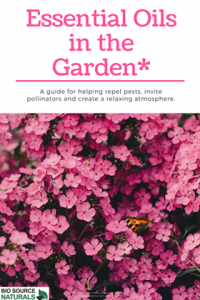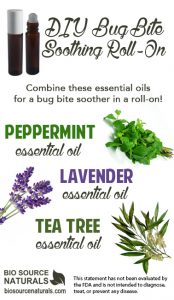 Using essential oils in the garden can help to repel pests, invite pollinators, or turn your garden into a lovely atmosphere for relaxation.
Using essential oils in the garden can help to repel pests, invite pollinators, or turn your garden into a lovely atmosphere for relaxation.
Repel Insects with Essential Oils in the Garden
Deet may be effective, but it also has serious health and environmental consequences. Side effects may include skin irritation, neurotoxicity, kidney and liver damage, birth defects, and more. Alternatively, essential oils that repel insects are also effective, as well as safe.*
Ylang Ylang and Palmarosa are two oils sometimes used to create natural bug sprays. And Ylang Ylang has been used as a mosquito repellent successfully in some studies. In one study, Lemongrass essential oil had high mortality rates against the three species of mosquitoes for up to 24 hours after application.*
To make homemade essential oil mosquito repellent, you’ll need:
- 4 oz clean spray bottle
- distilled water
- witch hazel or vodka
- your choice of essential oils, listed below (include Lemongrass and/or Citronella in your formulation)
Instructions:
1. Fill the spray bottle halfway with about 2 ounces of distilled water
2. Add 1 ounce of witch hazel or vodka
3. Add approximately half an ounce of essential oils (about 50 drops)
Don’t fill the bottle to the top! Also, oil and water will separate, so shake the mixture well before each use.

